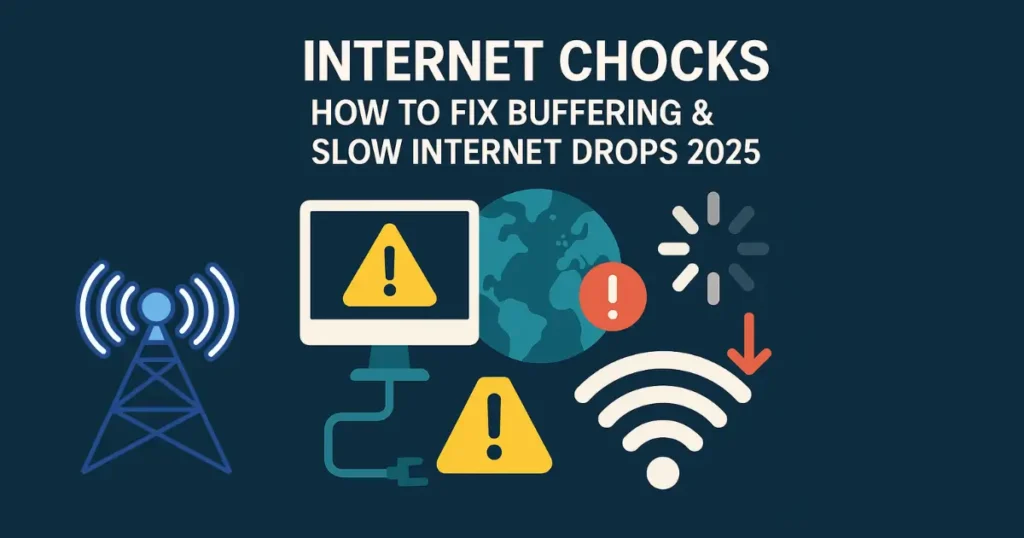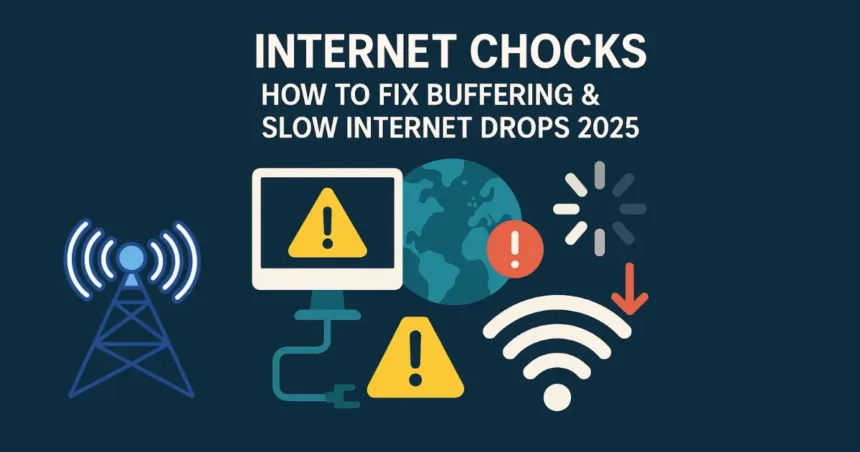
Internet chocks are a modern term used to describe minor but frequent disruptions or slowdowns in internet connectivity, often seen as lag, buffering, or disconnections. The word “chock” refers to a blockage — like a wheel chock stopping motion — and in this case, it’s your data packets coming to a screeching halt.
Internet Chocking Explained
Internet chocks don’t mean that your connection is totally gone — they refer to quick or random interruptions in your connection’s quality or speed. These can be:
- Drops in bandwidth on video streaming
- Micro-lags in online games
- Robotic voice distortion in VoIP
- Delayed or failed website loads
Symptoms of Internet Chocks
Typical signs include:
- Buffering circle appears frequently
- Latency spikes in online games (>100ms)
- Blurred or frozen web calls
- Pages not loading fully or timing out
- Failed file uploads or email sending delays
Common Causes of Internet Chocks
1. Bandwidth Saturation
Multiple users watching YouTube, streaming Netflix, or downloading updates will saturate bandwidth, causing chocks.
2. Router and Modem Issues
Overheating, firmware issues, or outdated routers can cause signal choppiness, even if your speed looks good on paper.
3. ISP Throttling
Internet Service Providers (ISPs) sometimes throttle (limit) connections during high traffic periods or specific usage types.
4. Hardware Incompatibility
Old laptops, misconfigured NICs (network cards), or faulty cables may underperform.
Upgrade your PC’s network adapter to Wi-Fi 6 capability or use a Cat6/Cat7 Ethernet cable.
5. DNS Resolution Delays
Slow or overloaded DNS servers can introduce website loading delays.
Use faster DNS providers like:
- Google DNS: 8.8.8.8
- Cloudflare DNS: 1.1.1.1
Set manually on your device or router.
How to Diagnose Internet Chocks
Step-by-Step Diagnostic Checklist:
- Run a speed test at Speedtest.net
- Check ping and jitter values (under 20ms is ideal)
- Use PingPlotter to visualize packet loss
- Identify which devices cause chocks when they go online
- Look for hourly trends using your router’s logs or apps like GlassWire
How to Fix Internet Chocks: 10 Proven Methods
- Reboot your Wi-Fi router/modem
- Update router firmware
- Use an Ethernet cable over Wi-Fi if possible
- Change your DNS provider
- Prioritize devices through QoS
- Disconnect unused devices
- Upgrade to a Mesh Wi-Fi system
- Contact your ISP to check local outages or reconfigure ports
- Use a VPN to avoid regional throttling
- Replace outdated hardware or use network extenders
Internet Chocks While Gaming
For gamers, even a 0.1 second delay can make or break a session.
Fix Gaming Chocks:
- Use Gaming Mode routers (ASUS RT-AX86U, Netgear Nighthawk)
- Choose closest game servers
- Avoid downloading or video calls while playing
- Schedule system updates during downtimes
Internet Chocks During Zoom or Teams Calls
Video conferencing platforms are bandwidth-hungry, and chocking often affects:
- Audio delay
- Screen sharing lags
- Blackouts during key discussions
Improve Call Quality:
- Install updates
- Use gallery view with fewer tiles
- Close all tabs or apps using bandwidth
- Turn off HD video if bandwidth is tight
Impact on Smart Homes and IoT Devices
Smart homes rely on seamless connectivity. If your Wi-Fi chocks randomly:
- Smart thermostats may not adjust on schedule
- Alexa/Google Assistant may have delayed reactions
- Security cams may stop recording or go dark
Solutions Include:
- Dedicated IoT Wi-Fi band (dual band or tri-band routers)
- Keep devices within 6–10 meters of routers
- Use Zigbee/Z-Wave hubs for smart tools that don’t require Wi-Fi
Best Tools to Monitor and Prevent Internet Chocking
| Tool | Main Purpose |
|---|---|
| GlassWire | Bandwidth monitoring & alerts |
| NetSpot | Home Wi-Fi coverage mapping |
| PingPlotter | Real-time latency & packet tracking |
| WiFiman | Android/iOS analyzer app |
| Cloudflare Warp | Speed up DNS & reduce throttling |
FAQs About Internet Chocks
What causes Internet chocks?
Often it’s bandwidth saturation, throttling, or weak signals causing temporary drops in connection speed or flow.
Are internet chocking and bandwidth throttling the same?
No. Chocking includes various small interruptions, not just intentional provider slowdowns (which is throttling).
Can upgrading my Mbps plan stop this?
Not always. If issues are localized to your home network or devices, a higher plan won’t fix them. Optimize setup first.
Do VPNs help prevent chocks?
VPNs can bypass ISP throttling and offer more consistent routing, but might add ping if not optimized.
Is a wired connection better than Wi-Fi?
Yes. For consistent, chock-free internet — wired Ethernet remains superior in both speed and reliability.
Conclusion: Don’t Let Internet Chocks Hold You Back
With our world more connected than ever, Internet chocks are more than an annoyance—they’re productivity blockers. Whether you’re gaming, streaming, working from home, or building a smart household, knowing the cause, fix, and prevention tips helps you stay ahead.






